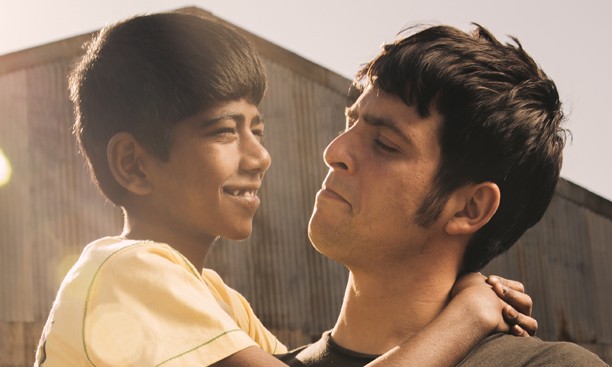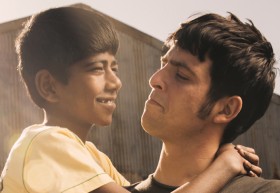A Response to Some Complicated Accusations
An Open Letter from Blood Brother Director, Steve Hoover
It’s been an amazing year. Since our debut at Sundance, Blood Brother has been shown in over 50 cities nationwide, and it’s been incredible to watch people’s responses. When I made this film, I had no idea that it would ever play outside of Pittsburgh. I’ve been humbled by the overwhelming support we’ve experienced.
Like every film, of course there are people who have been critical of Blood Brother. That’s to be expected. Discussion is a good thing, especially when it’s based in facts.
In the last few weeks however, there have been some unfortunate accusations I feel the need to respond to.
I’ve been surprised by the unfounded claim that Blood Brother is somehow secret evangelical propaganda. The idea that I made this film with some nefarious agenda would be funny to me if it wasn’t so potentially harmful. Neither Rocky nor myself consider ourselves evangelicals. We are both Christians, but we have no interest in pushing intolerant political agendas or using legislation to enforce doctrine. Nor do I see filmmaking as a means to fill the pews or make converts. I had no secret agenda.
Tom Roston of POV blog wrote an article I found particularly troubling, attempting to create the case that I deliberately disguised Rocky’s faith in the film. This simply isn’t true. Rocky’s faith is mentioned many times in the film, both in dialogue and in narration, yet Roston claims that the film’s approach to faith seems “secular.” This may come from a frustration that Rocky doesn’t fit within a cookie-cutter cliché of a Republican, Evangelical, American Christian. I understand why Roston might be tempted to group Rocky with certain vocal and very visible faith groups, but Rocky’s not that kind of Christian. His faith (among many complex motivations explored in the film) inspires him to love people in tangible ways, like cleaning the wounds and open sores of children with HIV with little regard for his own safety. That love isn’t some elaborate trick to get people to convert. When he takes a sick Hindu man to the hospital, there’s no expectation that the man will change his beliefs. Rocky cares for him because he needs care. Love is an end to itself.
It’s interesting that Roston would be “flummoxed” by a film showing a character, who happens to be a Christian, loving people without a larger Evangelical agenda. Does his seeming paranoia reveal a prejudice? While I want to assume the best, the article draws a staggering number of assumptions about Rocky and myself based solely on his cursory knowledge of our personal faith journeys.
He sees that Rocky and I attend the same church and questions whether our church is somehow the mastermind behind the film. The reality is that the church cautioned Rocky against going to India, and gave him no financial support or assistance. He was on his own. He never even asked them for donations because his trip was unrelated to the church’s goals. The church and its leadership had no creative input in the film and had no relationship to the film financially or otherwise. There were no church fundraisers. No secret evangelical overlords.
There are, however, some incredible people behind the scenes who supplied creative and financial support. Animal, Inc, the company I work for, produced and financed Blood Brother. They paid over $130,000 out of pocket for the film and donated thousands of hours of time. From story structure and edit to color and title animation, Animal was intrinsically involved at every level of production and post-production. That fact was conspicuously left out of Roston’s otherwise very lengthy investigation of our film.
There were many instances where I felt misrepresented in the article. In one example, he linked to an old music video on GodTube (a website I had only heard of referred to in jokes) instead of the official links on MTV, YouTube, or Vimeo. He connects random quotes from a church leader to the title of the film, as if the fact that we both use the word “brother” indicates some hidden message. The article seems to imply that because Christian websites praise the film, I must be in collusion with them. Unfortunately, there are more direct accusations of “cluelessness” and “lack of education.” He even claims I “manipulated” the film because I “didn’t want certain facts to be known.” It would be dishonest of me to say that this hasn’t stung, especially coming from a source I otherwise respect.
I appreciate that Roston took the time to talk to me directly, but I was disappointed in the tone he took throughout the course of our conversation. I respect him as a journalist, but it seemed that in this particular case he had a specific agenda going into the interview and became frustrated when the facts didn’t back up the ways he wanted to “connect the dots.”
I believe Blood Brother shows Rocky as a deeply flawed character. He’s emotional, erratic and frustrating at times. The film explores at some length how his abusive childhood produced in him a longing for true family. It’s a reoccurring theme culminating when (spoiler alert) Rocky breaks down at his own wedding. When Rocky first watched the film, I was afraid he was going to hate it because it portrays him in such a vulnerable light. Downplaying Rocky’s deep familial pain as “generic” as Roston does in his article may betray an insistence on forcing Rocky into some pre-existing religious category.
He’s complex, which is why I felt he would be a good subject for a character driven documentary. Like anyone, it’s hard to know Rocky’s exact motives. He was looking for adventure and he was angry at his family. He wanted to take amazing photographs yet had a desire for a more authentic life. More than anything, I think he just wanted to find his place. But Rocky didn’t go to India to make converts. He originally went with his friend Jay, an agnostic. They saw the orphanage as one of many stops in their adventure. He tried to leave and kept coming back because these kids are incredible, beautiful and worthy of love. They won him over. When I went there, they won me over too.
I hope Blood Brother shows that a person as flawed and vulnerable as Rocky can do incredible things when they choose to sacrifice their own comfort for others. It’s a testament to the power of unconditional love. And I believe love is larger than any one religion or ideology.
And that’s the point. That’s what I learned from making this film.
Of course the best thing to do is for you to watch it for yourself.
Notes:
- Our distribution is in collaboration with Tugg, Inc., which allows anyone to host a screening of the film. There are many different groups currently promoting the film. Who these groups are and what they say is entirely out of my control. Rocky is not an employee or spokesperson for any organization that may be hosting screenings of Blood Brother. We are grateful for any support given to the film and hope for absolute diversity in our audiences.
- The village where Rocky works has a combination of Hindu, Muslim and Christian populations. Tamil Nadu, the region where Rocky lives, has an ancient Christian tradition dating back as far as the first century. Needless to say, it’s very different from American Evangelicalism. The orphanage where Rocky volunteers (he’s not a staff member) is non-sectarian, though most of the kids have attended an Indian church since before Rocky came.
- Every dollar of profit from Blood Brother is being donated. Fifty percent is being donated directly to Red Hot Organization and Arms Around the Child. The other half is being donated to Rocky through L.I.G.H.T. to build half-way homes for HIV positive orphans and supply vocational training to build a bridge to healthy adulthood. No one is turned away from help because of their beliefs, gender, socio-economic status, etc. People in the halfway homes are not required to attend any church services or sign any belief statements. LIGHT is not funded, governed, or advised by any other NGO or non-profit, religious or otherwise. You can read exactly how the money will be used here.
- Through the success of the film, we’ve made connections with major pharmaceutical manufacturers and have secured improved second-line HIV/AIDS medication. Other HIV/AIDS related charities are using the film to promote the incredible work they are doing.





 LIKE US
LIKE US  FOLLOW
FOLLOW